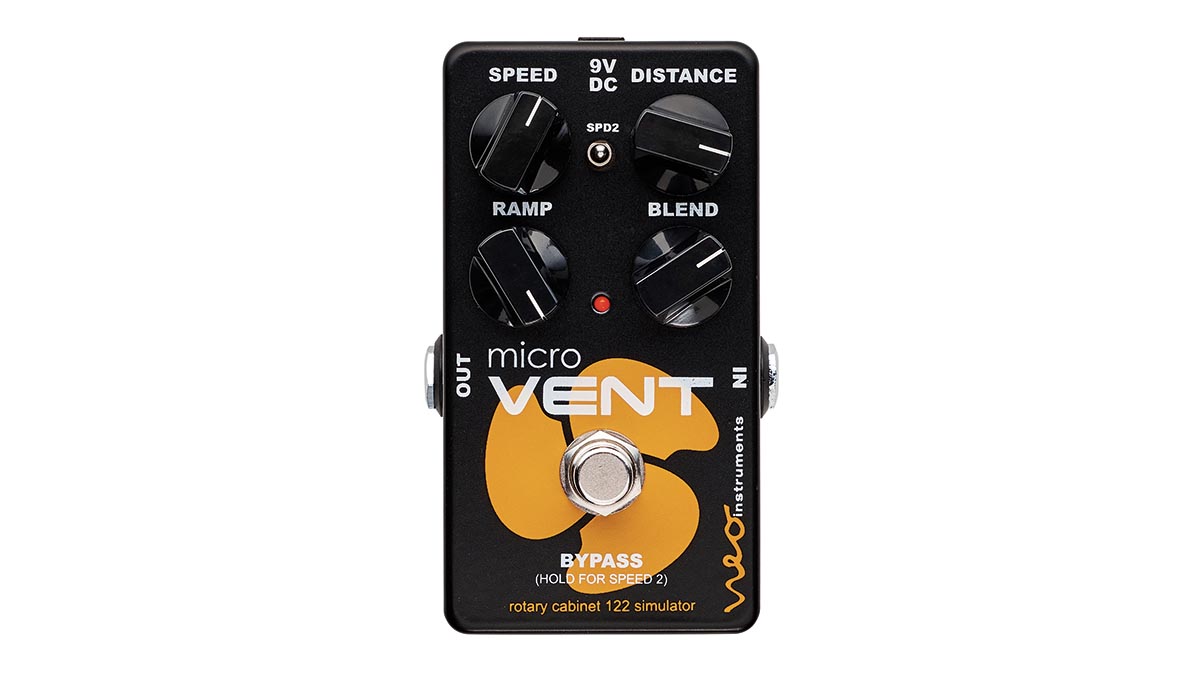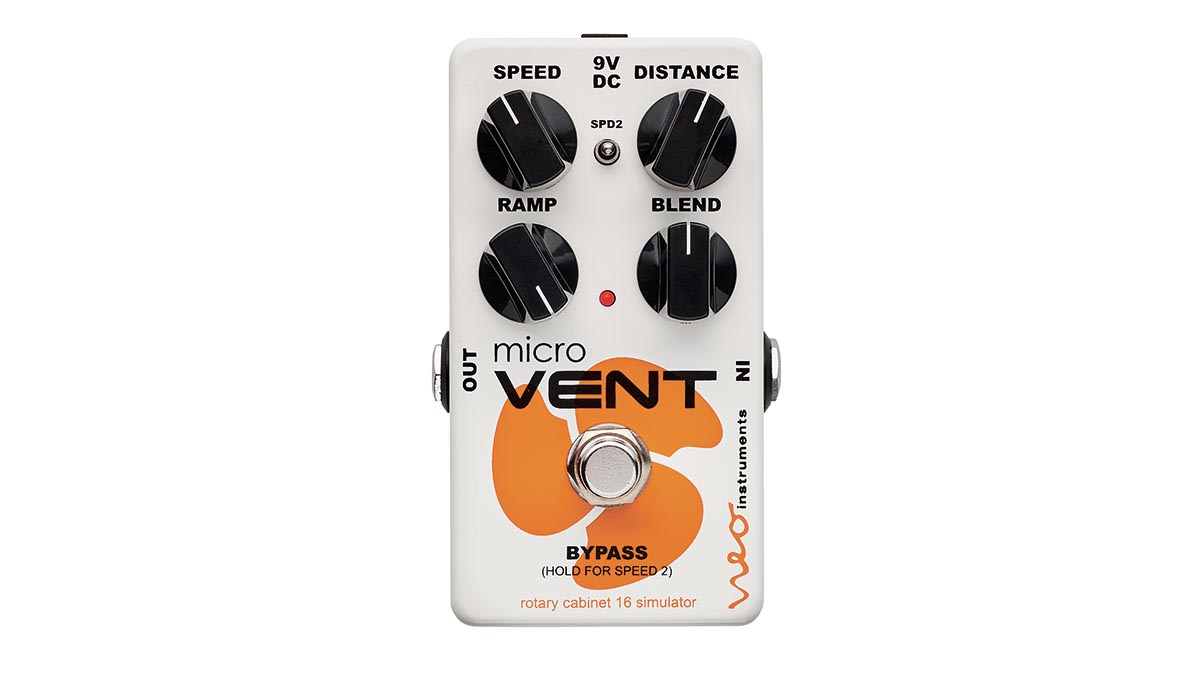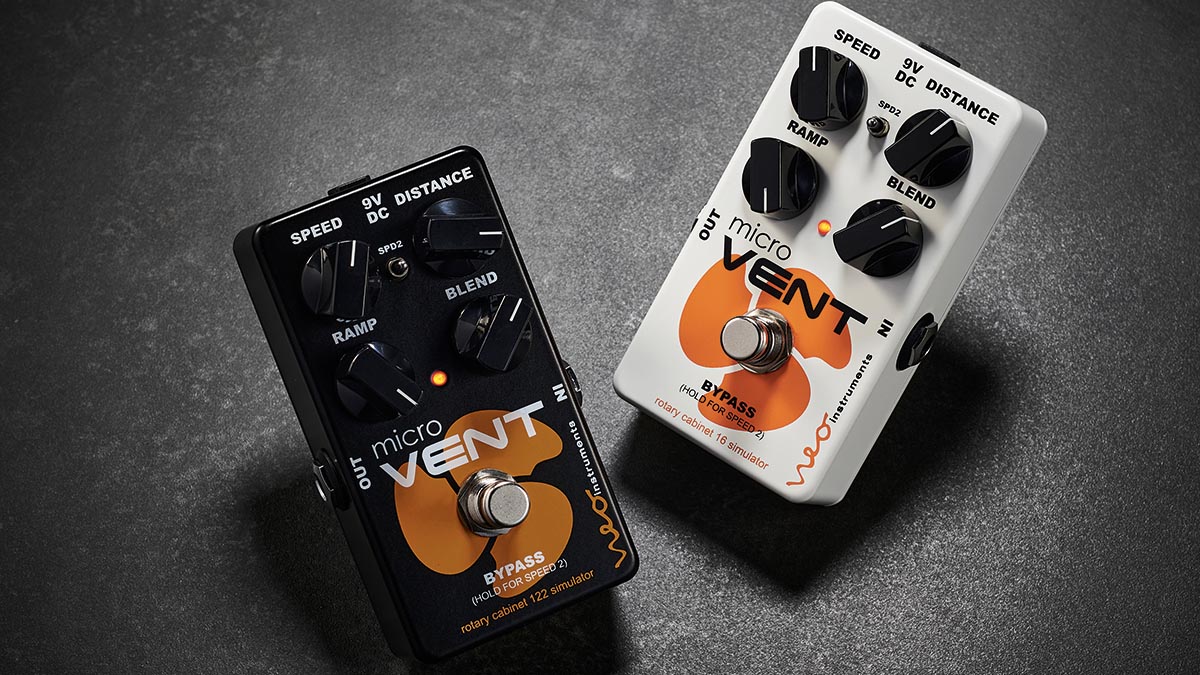Guitar World Verdict
The Micro Vent 122 offers full-range Leslie sounds for a mono signal chain with its essential facilities in a small footprint, but if you prefer that Vibratone sound to a full-range rotary, the Micro Vent 16 is a great way to add it to your pedalboard.
Pros
- +
Convincing sounds.
- +
Blend control allows for hybrid setups a la Gilmour.
- +
Compact form.
Cons
- -
Pricey.
You can trust Guitar World
Neo has established itself as a go-to brand when it comes to rotary speaker emulation pedals, with the likes of its Ventilator II and Mini Vent II models.
And now the company has come up with something a little more pedalboard-friendly with this pair of micro-sized Vent pedals, both of which are said to feature equally as powerful DSPs as the larger models.
One pedal is based on the sound of the Leslie 122, while the other emulates a Fender Vibratone – and both have identical facilities, including a single footswitch that is capable of the traditional speed-switching as well as bypass functions.
Micro Vent 122

This pedal’s algorithm is designed to emulate the sound of the classic large-cabinet Leslie 122 with separate rotary horn and drum, as captured by a pair of microphones.
A Distance knob sets the distance of those virtual mics, with the actual rotation being more apparent as they move outwards, deepening the tremolo aspect of the sound and adding top-end stridency.
Overall, the sound here is an authentic (albeit mono) representation of a full rotary speaker with all of that rich complexity, and realistic speed change is flexibly implemented.
The Speed knob, with a range from slow to fast, sets the primary speed, while a three-way toggle switch sets the second speed (a fixed Slow, Fast or Stop). Consequently, you can have a whole range of options (slow to fast, slow to stop, and so on), the transition time being set by a Ramp knob that offers a practical range of acceleration/deceleration.
All the latest guitar news, interviews, lessons, reviews, deals and more, direct to your inbox!
What’s more, the footswitch has various user-set modes so the switching can be momentary or latching. For subtle shading rather than the full-on effect, a Blend knob lets you mix dry and rotary sound in proportion.
Micro Vent 16

While Leslie speakers (with their built-in amps) were originally designed to partner organs, guitarists could more easily access the effect once the Leslie company obliged with cabinets that could be driven from a guitar amp.
The Leslie 16 and its derivative the Fender Vibratone, produced from the late 60s until the early 70s, eschewed the rotating high-frequency horn for a single rotating drum that spatially distributed the sound from a 10-inch speaker. The Micro Vent 16 is designed to reproduce that sound as captured by a single microphone.
Guitarists such as David Gilmour like a composite sound that features a rotary speaker alongside conventional cabs, and the Blend control on both these pedals will give you that
The 16 model has a less complex sound than the 122, not as rich and a little mellower, but it has a quality that sits particularly well with guitar sound to our ears. Now, certain guitarists, such as David Gilmour, like a composite sound that features a rotary speaker alongside conventional cabs, and the Blend control on both these pedals will give you that.
Arguably, however, it’s this one that emulates the sort of onstage setup that a gigging guitarist would be more likely to use – a conventional combo or cab alongside an easily portable Vibratone.
Specs
- PRICE: $399 / £269
- ORIGIN: Germany
- TYPE: Rotary speaker pedal
- FEATURES: Selectable true or buffered bypass, two selectable speeds, momentary and latched switching, output level attenuation (0 to -3dB), Leslie 122 emulation or Fender Vibratone emulation
- CONTROLS: Speed, Distance, Ramp, Blend, Speed switch (Fast/Slow/Stop), Bypass footswitch
- CONNECTIONS: Standard input, standard output
- POWER: 9V DC adaptor (not supplied) 180mA
- DIMENSIONS: 65 (w) x 113 (d) x 47mm (h)
- CONTACT: Neo Instruments
Trevor Curwen has played guitar for several decades – he's also mimed it on the UK's Top of the Pops. Much of his working life, though, has been spent behind the mixing desk, during which time he has built up a solid collection of the guitars, amps and pedals needed to cover just about any studio session. He writes pedal reviews for Guitarist and has contributed to Total Guitar, MusicRadar and Future Music among others.


